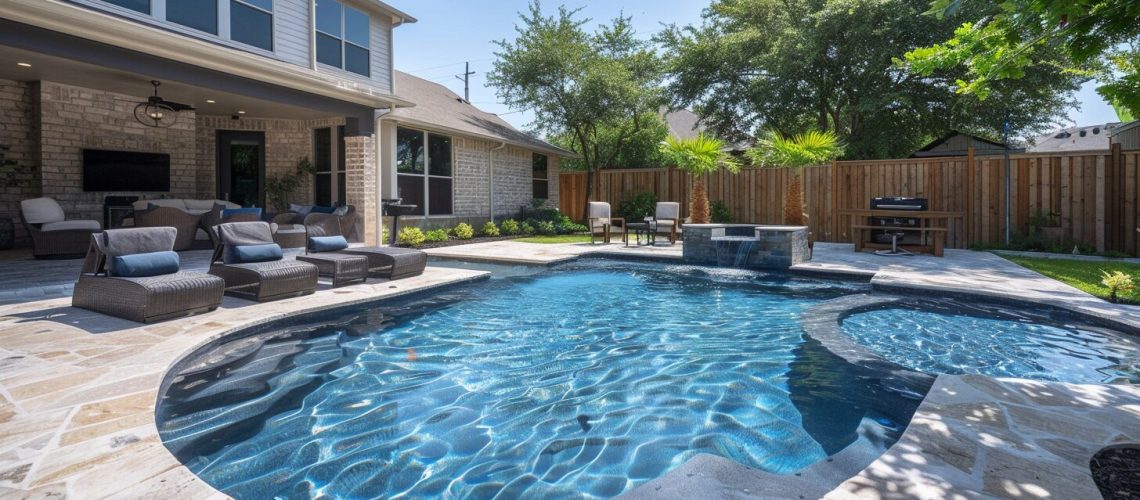Purchasing a Home with a Pool in Texas: What You Must Know
Are you considering purchasing a home with a pool in Texas? It’s an exciting decision that requires many considerations beyond the allure of having a private oasis in your backyard. This essential insights guide to purchasing a home with a pool in Texax will delve into relevant factors to help you navigate buying a home with a pool in the Lone Star State.
Understanding Texas Pool Laws and Regulations
In Texas, residential pool laws and regulations prioritize safety and minimize potential risks associated with pool ownership. When purchasing a home with a pool in Texas, one essential requirement to know is the installation of pool enclosures, which serve as barriers to prevent unauthorized access, especially for young children.
The Texas Health and Safety Code stipulates that residential pools must have a fence at least four feet tall, complete with self-closing and self-latching gates. Moreover, pools typically need safety measures like unauthorized entry alarms to enhance safety. These guidelines are in place to avert accidents and guarantee the safety of homeowners and their loved ones around pools.
Liability considerations are also essential under Texas pool laws. Homeowners with pools must adhere to specific standards to minimize liability risks.
This includes maintaining proper safety measures and complying with all relevant regulations. Understanding liability considerations is crucial for homeowners, as it can impact insurance coverage and legal responsibilities related to pool ownership. By familiarizing themselves with Texas pool laws and regulations, prospective buyers can make informed decisions and prioritize safety when purchasing a home with a pool.
Assessing the Pool’s Condition
When considering a home with a pool, assessing the pool’s condition and maintenance history is vital to gauge its long-term viability and potential costs. Signs of pool deterioration, such as cracks, discoloration, or leaks, can indicate underlying issues requiring costly repairs.
The filtration and circulation systems must be evaluated to ensure they function efficiently. An outdated or inefficient system can lead to poor water quality and increased maintenance costs. Reviewing the pool’s maintenance history provides insights into its upkeep and can reveal recurring problems or neglected maintenance tasks.
Understanding Pool Maintenance
Understanding the estimated maintenance costs associated with pool ownership is essential for budgeting. Regular cleaning and chemical treatments are necessary to keep the pool water balanced and free of contaminants.
Consider the energy consumption of pool equipment, such as pumps and heaters, which can significantly impact utility bills. Long-term maintenance and repair expenses should include potential repairs to the pool structure, plumbing, or electrical components.
By assessing the pool’s condition and estimating maintenance costs, prospective buyers can make informed decisions about purchasing a home with a pool.
Ensuring Pool Safety for Your Family

Pool safety is a top priority for any homeowner with a pool, particularly those with children or pets. Establishing clear pool rules and guidelines is crucial to promote safe behavior around the pool area. This includes setting age-appropriate swimming limits, prohibiting unsupervised access to the pool, and enforcing strict no-running or diving rules.
Safety measures like a robust pool enclosure with self-closing and self-latching gates can effectively deter unauthorized access and minimize accident risks. Additionally, installing pool alarms that trigger alerts upon detecting unauthorized entry into the pool vicinity is advisable. Educating family members, especially children, about pool safety practices and the importance of adult supervision around water can further enhance safety.
To maximize pool safety, homeowners should implement physical safety measures and maintain regular inspections and maintenance. This includes ensuring that all pool equipment, such as pumps, filters, and lights, is in good working condition and defects-free. Regularly inspect and repair any damaged pool surfaces, decking, or fencing to prevent accidents.
Providing adequate supervision during pool use, especially when children or inexperienced swimmers are present, is essential. By prioritizing pool safety through proactive measures and responsible behavior, homeowners can create a secure environment for their families to enjoy the pool safely.
Maximizing Your Pool’s Functionality and Enjoyment
Choosing the right pool accessories and features can enhance the functionality and enjoyment of your pool. Consider adding pool lighting for evening swims, a water slide or diving board for excitement, or a pool heater to extend the swimming season.
Investing in comfortable poolside furniture, such as loungers and umbrellas, creates a relaxing environment for leisure and entertainment. Landscaping around the pool with lush plants, flowers, and hardscaping elements can enhance the aesthetic appeal and ambiance of the pool area.
Additionally, consider incorporating water features such as fountains or waterfalls to add a touch of luxury and serenity to your pool oasis.
Creating Your New Personalized Oases
Creating a poolside oasis involves thoughtful planning and design to maximize aesthetics and functionality. Consider how you envision using the pool space for relaxation, recreation, or entertaining guests.
Homeowners can transform their pool into a true centerpiece of outdoor living by choosing the right accessories, landscaping, and design elements. Hosting pool parties and gatherings becomes more enjoyable when the pool area is designed for comfort and convenience. Ultimately, maximizing your pool’s functionality and enjoyment enhances the overall value of your property and enriches your lifestyle.
Understanding the Impact on Property Value
Consider how a pool affects property value in Texas. Factors influencing a pool’s desirability to buyers include condition, design, and maintenance costs. Balance the costs and benefits of pool ownership to make an informed investment decision.
Navigating Pool Inspections and Disclosures
When purchasing a home with a pool, navigate pool inspections and disclosures diligently. Understand what to expect from a professional pool inspection and the Texas seller disclosure requirements related to pools. Identify and address any red flags in pool disclosures to avoid surprises post-purchase.
Planning for Off-Season Pool Maintenance
In Texas, off-season pool maintenance is essential for year-round enjoyment. Learn how to winterize your pool to prevent freeze damage and other cold weather issues. Properly prepare your pool for spring and summer use to optimize its longevity and performance.
Connect with BPS, the Backyard Pool Specialists
For expert guidance and services related to pool ownership in Texas, connect with BPS, the Backyard Pool Specialists. BPS offers comprehensive pool services, including maintenance, repairs, and upgrades, to ensure your pool remains in top condition.
Buying a home with a pool in Texas opens up a world of possibilities and responsibilities. You can confidently make an informed decision by understanding pool laws, assessing pool conditions, prioritizing safety, maximizing enjoyment, and navigating inspections and disclosures. Connect with BPS, the Backyard Pool Specialists, to embark on your journey of owning a pool in Texas with peace of mind and expert support.



